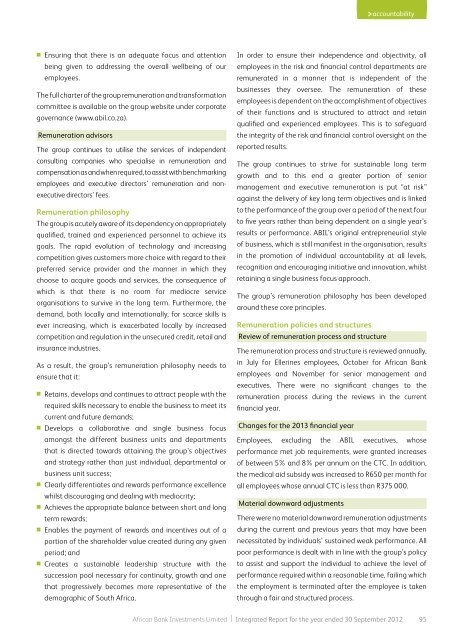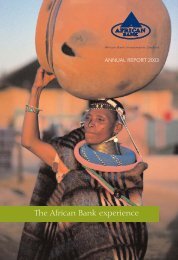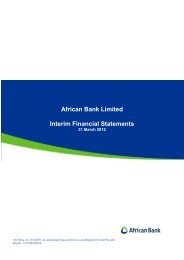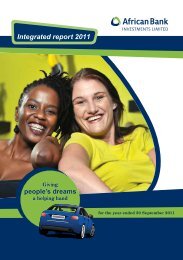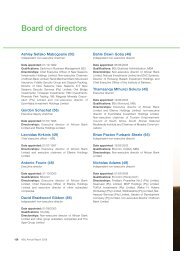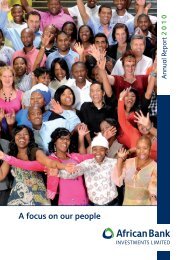Full annual report - African Bank - Investoreports
Full annual report - African Bank - Investoreports
Full annual report - African Bank - Investoreports
You also want an ePaper? Increase the reach of your titles
YUMPU automatically turns print PDFs into web optimized ePapers that Google loves.
■ Ensuring that there is an adequate focus and attention<br />
being given to addressing the overall wellbeing of our<br />
employees.<br />
The full charter of the group remuneration and transformation<br />
committee is available on the group website under corporate<br />
governance (www.abil.co.za).<br />
Remuneration advisors<br />
The group continues to utilise the services of independent<br />
consulting companies who specialise in remuneration and<br />
compensation as and when required, to assist with benchmarking<br />
employees and executive directors’ remuneration and nonexecutive<br />
directors’ fees.<br />
Remuneration philosophy<br />
The group is acutely aware of its dependency on appropriately<br />
qualified, trained and experienced personnel to achieve its<br />
goals. The rapid evolution of technology and increasing<br />
competition gives customers more choice with regard to their<br />
preferred service provider and the manner in which they<br />
choose to acquire goods and services, the consequence of<br />
which is that there is no room for mediocre service<br />
organisations to survive in the long term. Furthermore, the<br />
demand, both locally and internationally, for scarce skills is<br />
ever increasing, which is exacerbated locally by increased<br />
competition and regulation in the unsecured credit, retail and<br />
insurance industries.<br />
As a result, the group’s remuneration philosophy needs to<br />
ensure that it:<br />
■ Retains, develops and continues to attract people with the<br />
required skills necessary to enable the business to meet its<br />
current and future demands;<br />
■ Develops a collaborative and single business focus<br />
amongst the different business units and departments<br />
that is directed towards attaining the group’s objectives<br />
and strategy rather than just individual, departmental or<br />
business unit success;<br />
■ Clearly differentiates and rewards performance excellence<br />
whilst discouraging and dealing with mediocrity;<br />
■ Achieves the appropriate balance between short and long<br />
term rewards;<br />
■ Enables the payment of rewards and incentives out of a<br />
portion of the shareholder value created during any given<br />
period; and<br />
■ Creates a sustainable leadership structure with the<br />
succession pool necessary for continuity, growth and one<br />
that progressively becomes more representative of the<br />
demographic of South Africa.<br />
>accountability<br />
In order to ensure their independence and objectivity, all<br />
employees in the risk and financial control departments are<br />
remunerated in a manner that is independent of the<br />
businesses they oversee. The remuneration of these<br />
employees is dependent on the accomplishment of objectives<br />
of their functions and is structured to attract and retain<br />
qualified and experienced employees. This is to safeguard<br />
the integrity of the risk and financial control oversight on the<br />
<strong>report</strong>ed results.<br />
The group continues to strive for sustainable long term<br />
growth and to this end a greater portion of senior<br />
management and executive remuneration is put “at risk”<br />
against the delivery of key long term objectives and is linked<br />
to the performance of the group over a period of the next four<br />
to five years rather than being dependent on a single year’s<br />
results or performance. ABIL’s original entrepreneurial style<br />
of business, which is still manifest in the organisation, results<br />
in the promotion of individual accountability at all levels,<br />
recognition and encouraging initiative and innovation, whilst<br />
retaining a single business focus approach.<br />
The group’s remuneration philosophy has been developed<br />
around these core principles.<br />
Remuneration policies and structures<br />
Review of remuneration process and structure<br />
The remuneration process and structure is reviewed <strong>annual</strong>ly,<br />
in July for Ellerines employees, October for <strong>African</strong> <strong>Bank</strong><br />
employees and November for senior management and<br />
executives. There were no significant changes to the<br />
remuneration process during the reviews in the current<br />
financial year.<br />
Changes for the 2013 financial year<br />
Employees, excluding the ABIL executives, whose<br />
performance met job requirements, were granted increases<br />
of between 5% and 8% per annum on the CTC. In addition,<br />
the medical aid subsidy was increased to R650 per month for<br />
all employees whose <strong>annual</strong> CTC is less than R375 000.<br />
Material downward adjustments<br />
There were no material downward remuneration adjustments<br />
during the current and previous years that may have been<br />
necessitated by individuals’ sustained weak performance. All<br />
poor performance is dealt with in line with the group’s policy<br />
to assist and support the individual to achieve the level of<br />
performance required within a reasonable time, failing which<br />
the employment is terminated after the employee is taken<br />
through a fair and structured process.<br />
<strong>African</strong> <strong>Bank</strong> Investments Limited | Integrated Report for the year ended 30 September 2012 95


